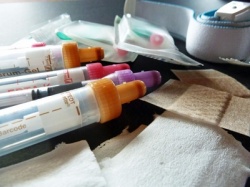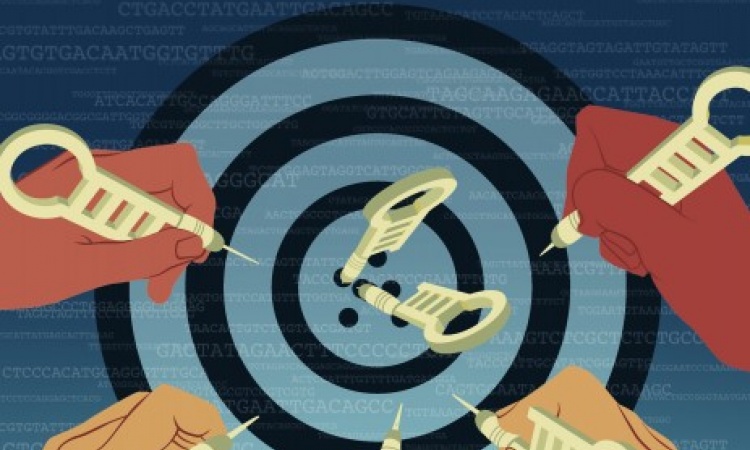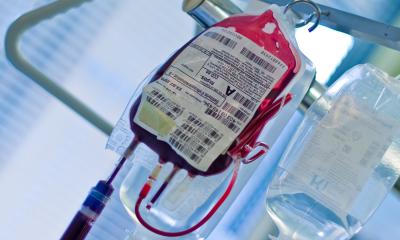A blood test for suicide?
Johns Hopkins researchers say they have discovered a chemical alteration in a single human gene linked to stress reactions that, if confirmed in larger studies, could give doctors a simple blood test to reliably predict a person’s risk of attempting suicide.

The discovery, described online in The American Journal of Psychiatry, suggests that changes in a gene involved in the function of the brain’s response to stress hormones plays a significant role in turning what might otherwise be an unremarkable reaction to the strain of everyday life into suicidal thoughts and behaviors.
“Suicide is a major preventable public health problem, but we have been stymied in our prevention efforts because we have no consistent way to predict those who are at increased risk of killing themselves,” says study leader Zachary Kaminsky, Ph.D., an assistant professor of psychiatry and behavioral sciences at the Johns Hopkins University School of Medicine. “With a test like ours, we may be able to stem suicide rates by identifying those people and intervening early enough to head off a catastrophe.” For his series of experiments, Kaminsky and his colleagues focused on a genetic mutation in a gene known as SKA2. By looking at brain samples from mentally ill and healthy people, the researchers found that in samples from people who had died by suicide, levels of SKA2 were significantly reduced. Within this common mutation, they then found in some subjects an epigenetic modification that altered the way the SKA2 gene functioned without changing the gene’s underlying DNA sequence. The modification added chemicals called methyl groups to the gene. Higher levels of methylation were then found in the same study subjects who had killed themselves. The higher levels of methylation among suicide decedents were then replicated in two independent brain cohorts.
In another part of the study, the researchers tested three different sets of blood samples, the largest one involving 325 participants in the Johns Hopkins Center for Prevention Research Study found similar methylation increases at SKA2 in individuals with suicidal thoughts or attempts. They then designed a model analysis that predicted which of the participants were experiencing suicidal thoughts or had attempted suicide with 80 percent certainty. Those with more severe risk of suicide were predicted with 90 percent accuracy. In the youngest data set, they were able to identify with 96 percent accuracy whether or not a participant had attempted suicide, based on blood test results.
The SKA2 gene is expressed in the prefrontal cortex of the brain, which is involved in inhibiting negative thoughts and controlling impulsive behavior. SKA2 is specifically responsible for chaperoning stress hormone receptors into cells’ nuclei so they can do their job. If there isn’t enough SKA2, or it is altered in some way, the stress hormone receptor is unable to suppress the release of cortisol throughout the brain. Previous research has shown that such cortisol release is abnormal in people who attempt or die by suicide. Kaminsky says a test based on these findings might best be used to predict future suicide attempts in those who are ill, to restrict lethal means or methods among those a risk, or to make decisions regarding the intensity of intervention approaches. He says that it might make sense for use in the military to test whether members have the gene mutation that makes them more vulnerable. Those at risk could be more closely monitored when they returned home after deployment. A test could also be useful in a psychiatric emergency room, he says, as part of a suicide risk assessment when doctors try to assess level of suicide risk. The test could be used in all sorts of safety assessment decisions like the need for hospitalization and closeness of monitoring. Kaminsky says another possible use that needs more study could be to inform treatment decisions, such as whether or not to give certain medications that have been linked with suicidal thoughts.
“We have found a gene that we think could be really important for consistently identifying a range of behaviors from suicidal thoughts to attempts to completions,” Kaminsky says. “We need to study this in a larger sample but we believe that we might be able to monitor the blood to identify those at risk of suicide.” Along with Kaminsky, other Johns Hopkins researchers involved in the study include Jerry Guintivano; Tori Brown; Alison Newcomer, M.Sc.; Marcus Jones; Olivia Cox; Brion Maher, Ph.D.; William Eaton, Ph.D.; Jennifer Payne, M.D.; and Holly Wilcox, Ph.D. The research was supported in part by the National Institutes of Health’s National Institute of Mental Health (1R21MH094771-01), the Center for Mental Health Initiatives, The James Wah Award for Mood Disorders, and The Solomon R. and Rebecca D. Baker Foundation.
30.07.2014





